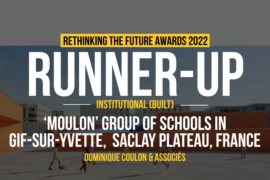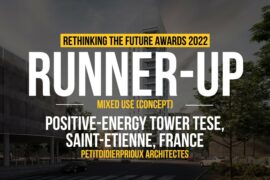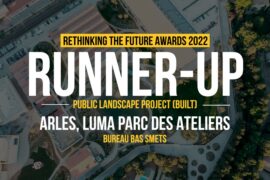Project Info
Architects: Mikou Design Studio
Location:Valenciennes,France
Client: Valenciennes Metropole
Surface Area: 32,000 m²
Date: Competition Entry 2012

Introduction
The Transalley Technopole is a metropolitan scientific and technological project of an international dimension, dedicated to transportation and mobility, located on a strategic site of the Valenciennes urban area. The competition proposal by Mikou Design Studio aims to be a real ecosystem of innovation, and it will host the Institut des Transports Durables (Sustainable Transport Institute), the Institut International de Management, and the head office of IRT Railenium, which will be a major research and development center dedicated to railway infrastructure. More images and architects’ description after the break.

Details
Plots G and H are centrally positioned on one site combining training, higher education, innovation and the locations of economic activities and a range of joint services in sustainable transport and technological innovation. Plots G and H present an architectural and urban planning challenge of linking together these various elements of the program to create a strong image representative of the Technopole’s dynamic and its national and international ambition.
We conceived the architectural and urban scheme of plots H and G as a strong symbolic gesture of identification and expression on the scale of the area encompassing the university campus, the Transalley Technopole and the municipal district of Famars. The longitudinal strips with undulations and expansions form a topography on the scale of the landscape and were inspired by the concept of mobility and speed.

The design scheme aimed to express the specific factors that constitute Valenciennes’ excellence, that is, the subjects of Mobility and Transport. Therefore the scheme’s general form is strongly inspired by the concept of flows and movement inherent to the question of mobility and speed. We believe it is appropriate that the block plan and the general functioning of all the programs in the atrium strongly express this vision of movement, mobility and flows specific to railway lines. The scheme is like a composition of undulating linear strips of the same width as a train (viz., 3.15m), which describe longitudinal paths and free brightly-lit interior spaces that correspond to the glass-roofed atriums of each program.

All these interior spaces are interconnected in a continuous flow within a spatial continuum linking all the atriums. From the viewpoint of massing, the longitudinal strips form a topography on the scale of the landscape, with undulations and expansions that free great heights and generous spaces in the exhibition and showroom areas.





